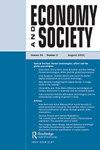Recentering central banks: Theorizing state-economy boundaries as central bank effects
IF 4.3
2区 社会学
Q1 ECONOMICS
引用次数: 18
Abstract
Abstract This special issue argues that to make sense of the increased prominence of central banks after the 2008 financial crisis and COVID-19 pandemic requires interrogating the sources of and limits to their governmental power. In a time in which the ‘big state’ has returned alongside new forms of financial speculation, the theoretical claim advanced by this introductory paper is that the state ‘effect’ is in crucial respects conditioned by the economic governance arrangements set in place by central banks. We show that at the same time as promoting entanglements between states and markets, central banks attempt to draw new boundaries between state and economy, lending an unstable and sometimes contradictory character to their interventions. Providing the outlines of a new historical sociology of central banking which introduces the papers in the special issue, we explore the double movement that has underpinned the evolution of central banking since early modernity and holds clues for unravelling the paradoxes of the present.中央银行重整:中央银行效应下国家经济边界的理论化
本期特刊认为,要理解2008年金融危机和COVID-19大流行后中央银行日益突出的地位,就需要对其政府权力的来源和限制进行质疑。在“大国”与新形式的金融投机一起回归的时代,这篇介绍性论文提出的理论主张是,国家的“效应”在关键方面受到中央银行制定的经济治理安排的制约。我们表明,在促进国家和市场之间纠缠的同时,中央银行试图在国家和经济之间划定新的界限,使其干预具有不稳定,有时甚至是矛盾的特征。我们提供了一种新的中央银行历史社会学的概述,介绍了特刊中的论文,我们探索了自早期现代性以来支撑中央银行发展的双重运动,并为解开当前的悖论提供了线索。
本文章由计算机程序翻译,如有差异,请以英文原文为准。
求助全文
约1分钟内获得全文
求助全文
来源期刊

Economy and Society
Multiple-
CiteScore
6.30
自引率
5.90%
发文量
23
期刊介绍:
This radical interdisciplinary journal of theory and politics continues to be one of the most exciting and influential resources for scholars in the social sciences worldwide. As one of the field"s leading scholarly refereed journals, Economy and Society plays a key role in promoting new debates and currents of social thought. For 37 years, the journal has explored the social sciences in the broadest interdisciplinary sense, in innovative articles from some of the world"s leading sociologists and anthropologists, political scientists, legal theorists, philosophers, economists and other renowned scholars.
 求助内容:
求助内容: 应助结果提醒方式:
应助结果提醒方式:


